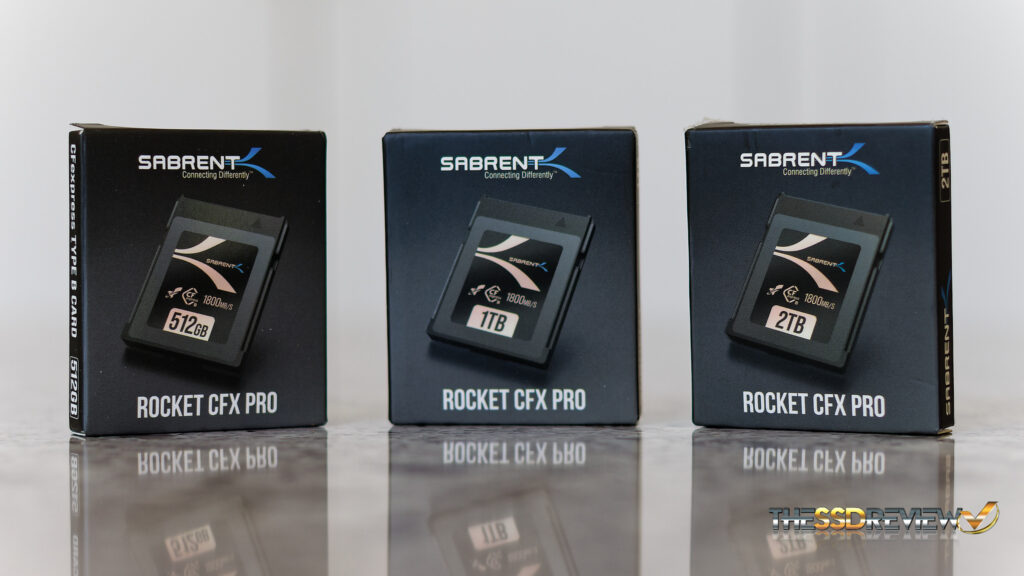Sabrent has just released an upgraded version of their Rocket CFX CFExpress B Memory Cards and added the name PRO to make sure they are a distinct entry in the storage space. They are available in 512GB, 1 and 2TB and we have had the opportunity to spend some time with all three. Performance is rated at 1800MB/s read and 1700MB/s write for all three capacities but sustained writes are where it is at in the world of digital media these days…that and card temperature under heavy use.
Specs for the two higher capacities speak to a sustained write performance of 1300MB/s which drops a bit for the 512GB. The good news for most if that this is a moot point as this is way above the 400MB/s threshold that we now call the VPG400 specification and, even at 825GB/s sustained write…. you will love this drive.
The shear beauty of the Sabrent Rocket CFX Pro has to be the fact that higher speeds and higher sustained writes are now becoming the norm for higher capacity CFExpress B cards. Will most use a 2TB card to its full advantage? Perhaps not the typical enthusiast but anyone holding an Canon EOS R5 or similar camera with 8K capabilities knows exactly what I am talking about. A 2TB media card capable of 1300MB/s sustained write performance is a dream come true for so many digital media nuts.
Price Point. Checking Etailers right now, we can see the Rocket CFX Pro at $199 for the 512GB, $399 for the 1TB and $599 for the 2TB version.
TSSDR TEST BENCH AND PROTOCOL
SSD testing at TSSDR differs slightly, depending on whether we are looking at consumer or enterprise storage media. For our Sabrent Rocket CFX Pro CFExpress B Memory Card testing today, our goal is to test in a system that has been optimized with our SSD Optimization Guide.
For this Test Bench, there are no bios performance tweaks whatsoever and the new ASUS Maximus Z790 Hero brought us to over 6GHz while the newest Kingston Renegade Fury DDR-5 memory rests comfortably at 7200MHz.
The components of this Test Bench are detailed below. All hardware is linked for purchase and product sales may be reached by a simple click on the individual item.
INTEL Z790 PCIE 5.0 COMPONENTS
| PC CHASSIS: | Corsair 5000D RGB White Tempered Glass Chassis |
| MOTHERBOARD: | ASUS ROG Maximus Z790 Hero Gen 5 |
| CPU: | Intel 13th Gen Core i9-13900K |
| CPU COOLER: | Corsair Hydro Series H150i Capellix White |
| POWER SUPPLY: | Corsair HX1000i Platinum Modular 80Plus |
| GRAPHICS: | ZOTAC GeForce RTX 3080 Trinity White |
| MEMORY: | Kingston Renegade Fury RGB DDR5-7200 32GB |
| STORAGE: | Sabrent Rocket 4 Plus Gen 4 4TB NVMe SSD |
| KEYBOARD: | Corsair K70 PRO RGB Optical Mechanical Gaming |
| MOUSE: | Corsair M65 RGB Elite FPS Gaming |
| MONITOR: | Samsung 34? 1440p WQHD Ultrawide Gaming |
BENCHMARK SOFTWARE
The software in use for today’s analysis is typical of many of our reviews and consists of Crystal Disk Info, ATTO Disk Benchmark, Crystal Disk Mark, Anvil’s Storage Utilities, TxBench, as well as Sustained Disk Transfer, Temperature and True Data Transfer Rate Testing. Our selection of software allows each to build on the last and to provide validation to results already obtained.
 The SSD Review The Worlds Dedicated SSD Education and Review Resource |
The SSD Review The Worlds Dedicated SSD Education and Review Resource | 


Dear All?
Does anyone know, if this card (1TB, Type B PRO) is working with a PhaseOne XF camera & their digital IQ4 back (150MP)?
It is impossible to get an answer from PhaseOne (= haven’t tested this card) or from Sabrent (= have not tried it with a PhaseOne). B&H cannot tell either (= don’t sell PhaseOne any longer).
Kind regards, Frank Thiel